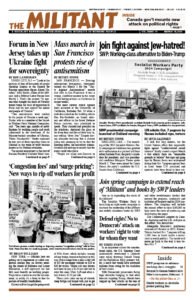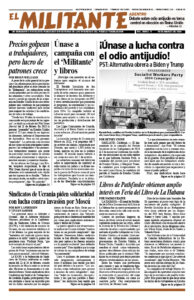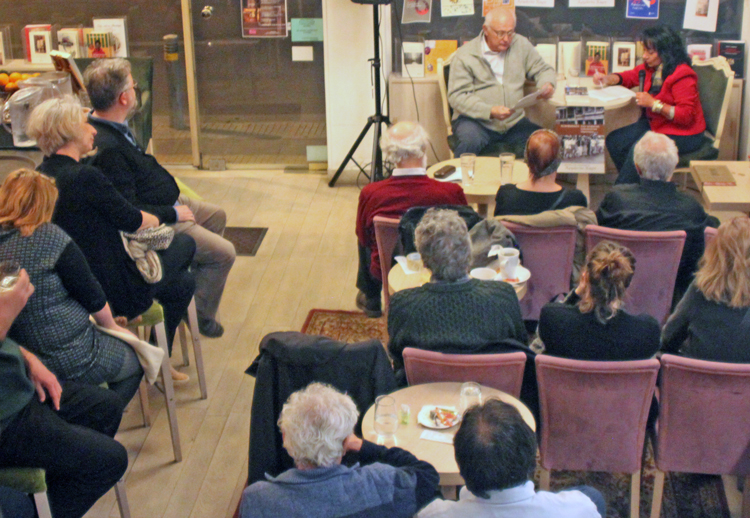ATHENS, Greece — Some 40 people gathered here Feb. 24 to celebrate the Jan. 1 anniversary of the Cuban Revolution and for the launch of the newly published Greek edition of Aldabonazo, Inside the Cuban Revolutionary Underground 1952-58 by Armando Hart. The event was organized by Diethnes Vima, the book’s publisher in Greece, and held at the Enastron Cafe-Bookstore. A number of area workers came, to what for many was the first meeting on the Cuban Revolution they’d attended.
Aramis Fuente Hernández, Cuba’s ambassador to Greece, opened the meeting by highlighting Hart’s contributions to the revolutionary struggle. “When he was 22, Hart was one of the youth with a rebellious spirit that fought against the military coup by Batista in 1952. Then he joined the struggle led by Fidel [Castro]. In Fidel he saw all the elements — political, moral and human — that would make him the true and admired leader of the people, capable of heading an authentic and victorious revolutionary struggle,” Fuente said.
“Hart carried out important work in the ‘plain,’ where he had the responsibility of maintaining revolutionary activities in the urban areas of the country.
“This book, which contains many materials the haven’t been published before, refutes completely the attempts of the enemies of the revolution to distort the real character of the struggle of the Cuban people and its vanguard,” Fuente said. “They managed to integrate thought and action and to channel the spirit and traditions of struggles of our people, finally achieving, after almost a century, true and definitive independence.”
Nikos Karandreas, president of the Greek-Cuban Friendship Society, said, “The humanism, anti-imperialism and Pan-Americanism of José Martí united these youth of whom Hart was an integral part. Along with that were the ethical positions of Fidel. It is out of this human material that a communist nucleus was forged, which saw the need to lead a socialist revolution. Thousands of Cubans came to say if Fidel is a communist, then sign me up.”
“One of the most important aspects of the book is the exposure of the Miami Pact, which would have limited the overthrow of Batista within a strictly bourgeois context,” he said. “Among the signers were people who said they represented the July 26 Movement. The book explains how Fidel immediately went public and denounced the pact, a very important political statement.
“This new book helps in understanding the dynamics of the Cuban Revolution and it is an important tool for our work in solidarity with it,” said Karandreas.
Natasha Terlexi, editor of the Greek edition and president of Diethnes Vima, said, “We want to give homage to the contribution of Dina Kaklamanaki, who passed away in 2022. She served as the secretary at the Cuban Embassy for 30 years. Upon her retirement she volunteered some of her precious time translating books on the Cuban Revolution published by Diethnes Vima. The Greek edition of Aldabonazo is the result of that work.
“Most of all she was a person convinced of the just cause that the Cuban Revolution represented, which she supported actively. We dedicate tonight’s event to her. We also want to thank the members of her family who are here with us tonight,” Terlexi said. She also thanked Pathfinder Press in New York for publishing and providing all the material for this book.
“This book is for each person who feels oppression and injustice and is today struggling for a dignified life, for the right to education, health care, culture, a world without wars,” Terlexi said. “In 1959 the workers and farmers of Cuba succeeded in taking power into their own hands. Subsequently they took the productive forces of society into their own hands as well, and organized the economy and defense, education and health care to meet the needs of the working people.”
“This book is for every worker who is having difficulty envisaging that making a revolution is possible. It is the story of Armando Hart, of how he was with the Cuban Revolution from the beginning and remained a living part of that process for his whole life.”
Hart died in 2017. He served as minister of education after the revolution, directing the mass literacy campaign in 1961. Hart was a member of the Political Bureau of the Cuban Communist Party Central Committee through 1991, and minister of culture until 1997, when he became the founding director of the José Martí Cultural Society.
Terlexi pointed to key lessons from the book: “How the workers and peasants themselves were the agents of their own emancipation; the decisive role of a revolutionary leadership, which Fidel constructed; the necessity to fight not only against a dictator but against a society built on social exploitation; the essential role of a leading organization, a disciplined organization that laid the seeds for a socialist revolution; and the need to unite the toilers on the basis of a program that represents their independent interests.”
She urged those at the meeting to join in the fight against Washington’s over-six-decades-long economic war against the Cuban Revolution, “their hatred of the example it sets for toilers in the Americas and the world.”
People stayed after the program for discussions over snacks, drinks and coffee in the cafe. Some went to a nearby tavern to continue the discussions after the cafe closed. A total of seven copies of Aldabonazo were sold during the evening.


